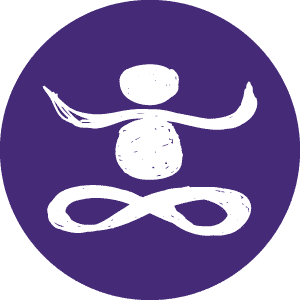We all know the feeling of stress… whether it’s the pressure of a bulging belly, the strain of loaded muscles, or a deeply furrowed brow, it’s the body’s awareness that something is happening now. (The featured photo shows a system that has not managed the demands of a 13 mile run in -20 degrees very well!) Stress is change; it can be exciting; it can be overwhelming. Stress isn’t good or bad on its own (though it is actually essential to our development.) How we manage stress makes all the difference.
Helping you to manage stress is one of our main objectives here at Yoga for Mental Health. This article outlines how we do it and how you can too!
1. Reduce or eliminate stressors
You’ve probably heard the phrase: A rising tide floats all boats. This is true of stress too. We can handle just about anything but not all at once! When you’re feeling overwhelmed, especially by something stressful that seems out of your control, you may find some relief by reducing or eliminating some other (minor, usually manageable) stressors.
In order to manage stress by reducing or eliminating stressors, it’s important to understand what constitutes “stress.” At Yoga for Mental Health, we use mindfulness techniques to become more aware of our surroundings and how they affect us. Our senses are the doorways into our inner world. Anything that comes to us via our senses can register a stress response. It might be so subtle that you don’t even notice it. It might be so glaring that you can’t notice anything else.
It is both the quantity and the magnitude of signals that can overwhelm our system. Noise can be particularly insidious and has been linked to a wide range of deleterious health conditions. This is a good place to practice reducing exposure. Here are a few simple suggestions: turn off the car radio, take a walk (or do the dishes) without a podcast or audio book in your ears, close the door to the laundry room when the washer or dryer are running, bring ear plugs to the movies, wear noise cancelling headphones while traveling…
I know that some of these might seem counterintuitive to some of you. I frequently have people tell me that they listen to music, audiobooks, or podcasts as a way to manage stress. And it may very well feel less stressful to hear something pleasant than something unpleasant. However, we’re not talking about absolutes; we’re considering strategies. Your relative willingness (or resistance) to something new or different might just be another indicator of an overloaded system. Try a negotiation. Make it as easy as possible. Maybe you just turn down the volume.
Everything our senses take in prompts a response. Sometimes, it’s subtle, usually, it’s subconscious. Either way it takes energy and you might not have any to spare.
Segue to our next strategy…
2. Prioritize and facilitate rest
A stress response is a physical process. It includes the mobilization of virtually every system in the body. Some functions are suppressed while others are prioritized in a split second assessment of what is happening in your world. The demand of constant stimulation and response eventually exhausts available resources. Production simply can’t keep up with demand indefinitely.
This happens quite predictably over every 24 hour period. Periods of rest during which our body can renew resources are so essential to our survival that the sleep/wake cycle is regulated by the brain stem and is among the most basic functions of life. Sleep deprivation is a common form of stress. And, like with all stressors, we can handle it, sometimes. Also, like all other forms of stress, it contributes to our overall resilience, or lack thereof. A negotiation of expectations and variety of options can also be useful here.
Rest can come in many forms and to broaden your understanding about what qualifies as “rest” may help you to incorporate more of it.
You can refer back to stress management strategy #1 for ideas about how to rest individual senses. You can practice resting your eyes or your ears. You can also tune into and rest parts of your body. This is integral to our practice at Yoga for Mental Health. We practice distinguishing between a contracted muscle, a stretched muscle, and a relaxed muscle. We learn to position our joints (sometimes with the help of props) so that muscles can rest. We practice resting between breaths. You can try doing that now. Inhale… pause. Exhale… pause.
It can take 10 minutes for a muscle to completely release a contraction. This is probably longer than we think. A timer can be an incredibly helpful tool to help manage stress. Once you find a relatively relaxed position (could be eyes closed, noise quieted, body situated, or all of these) set a timer for 10 minutes and do your best to stay relatively quiet and still until the timer goes off.
Another alternative is to “rest” in a rhythmic movement, like walking. Our Learn to Meditate course includes a lesson on walking meditation. It’s different than “going for a walk” and can be a good stepping stone from high activation to a more restful state.
A timer can also help remind you to rest your eyes regularly when reading, to let your brain take breaks and rest between tasks, to help you remember to change position so the parts of your body that are bearing your weight can rest. I especially love the rhythm of using a timer for bread baking and integrating my rest and work periods with it.
This prioritization (and timing or scheduling) of rest can extend from 1-2 minutes breaks throughout the day to 1-2 days, or weeks, or monthlong breaks throughout the year. Most spiritual traditions include some version of fasting as a practice to help cultivate compassion and sharpen the focus of intention. It is also true that fasting, vacation, rest days, retreat, recreation, sabbatical… can restore a deep sense of our capacity, even our hunger. Competitive athletes know this, their rest days are non-negotiable parts of their training regime.
I’d encourage you to come up with a few strategies around rest for the season. Maybe you’d like a day (or an hour!) away from your cellphone… try it! Maybe you’ll try letting your gut have a break from a food or beverage that can be agitating. Maybe you could try 10 minutes in a restorative yoga pose at the end (or in the middle!) of the workday. Another favorite is 1-2 minutes of mindful breathing before starting the car.
A nice collection of options can help you, especially the more stressed part of you, still feel like you have some agency while also relying on the supportive structure of the commitment that you’ve made to take care of yourself. I’d recommend writing these down and putting the list in a prominent place. It can also be helpful to track your commitment on a calendar.
Discipline and flexibility are known as the the two pillars of yoga. If you can strike the balance between them, you will find a poise that sustains.
3. Get out there and manage stress like a boss!
Controlled, intentional exposure to stress is the stuff that dreams are made of! Whether this is showing up for a friend or family member in need, strapping on skis, showing up for class, trying a new recipe, making a new friend, lifting weights, sitting down to write, or paint, or play, or meditate… you can do hard things!
Developing skills, building tolerance for discomfort, and practicing stress management regularly (not only when it’s live or die) increases your overall resilience and capacity.
You are a dynamic being. You are in a constant state of becoming.
Your ability to continue to have novel experiences, to live a full and fulfilling life, is entirely dependent on what you make of what you’ve already been through, what kind of expectations you have set out for yourself, and how you manage the unexpected.
I’d offer you the following phrases to consider integrating into your practice (and encourage you to come up with your own):
- “Everything is working out perfectly.”
- “I’m right where I need to be.”
- “I belong here.”
- “It’s all going to work out.”
- “May I be strong and resilient.”
As you learn to manage stress by reducing, eliminating, resting, recovering, and then rebuilding you will find more and more ease, confidence and joy too!
Final thoughts on stress
In conclusion, I think it’s important to mention that this is, quite paradoxically perhaps, both a linear and a decidedly non-linear process. Our stress response system is inexorably linked to our memories. In there are characters, smells, situations, phases, and other aspects of experience that may have long been buried in the subconscious. As a result, we may find that we have a relatively difficult time uncovering or understanding our own particular stress profile, especially if we have been close to major stressors or traumas as children or when otherwise vulnerable.
Our stress response system is also inexorably linked to our cultural context… skin color, sex, speech, gender, profession, beliefs, hobbies, and habits are all measured against norms maintained by a dominant caste. The more “different” you are, the more stressful it is likely to be. Here is great pain and great promise.
This is both an individual and a communal opportunity. How can we reduce and eliminate stressors for all beings? How can we prioritize rest for recovery for all beings? How can we encourage growth and the realization of all beings?
Let these questions guide you… on behalf of all beings, thank you.








